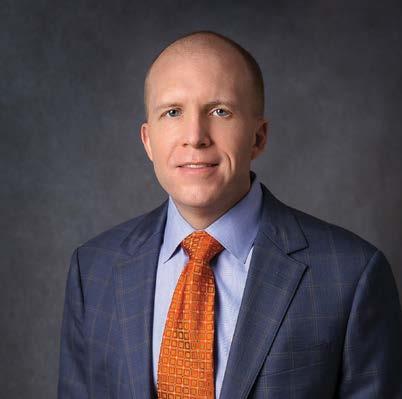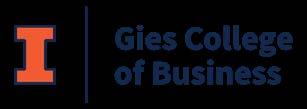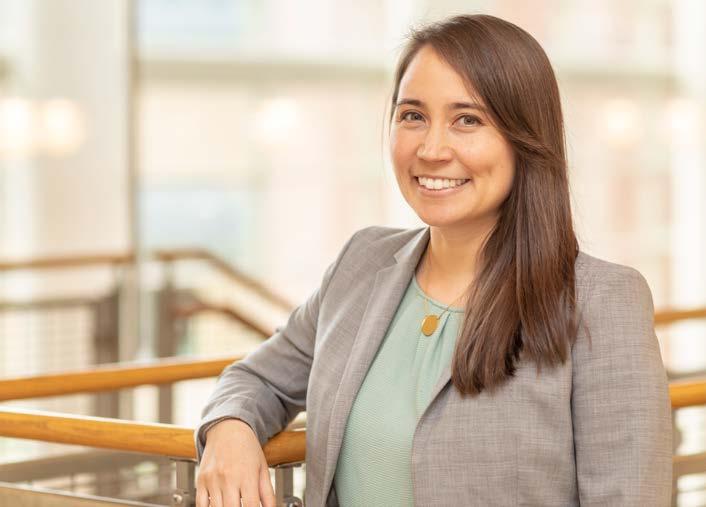ACCY Update

From the Department Head

“Fortunately, for over a century, a mindset of innovative, continuous improvement has been deeply ingrained in our DNA.”
Dear Colleagues and Friends,
This month, the Department of Accountancy is undergoing a formal reaccreditation process with the Association to Advance Collegiate Schools of Business, along with a campus-level academic program review process with the Office of the Provost. These processes provide valuable opportunities to thoroughly reflect on how we can best sustain our legacy of excellence. Fortunately, for over a century, a mindset of innovative, continuous improvement has been deeply ingrained in our DNA.
Since our last accreditation review, over the past five years, we’ve launched 13 new courses to enhance the learner experience, including 10 focused on data. Our faculty members have greatly contributed to accounting knowledge with 148 articles in peer-reviewed journals, receiving 26 awards for their research during that time span.
This issue of ACCY Update showcases how we continue to stay true to our vision to lead the world in accountancy education and thought by adapting to rapid changes in both the accounting profession and higher education.
You’ll learn how one of our innovative programs is revolutionizing business analytics education and how unique partnerships are shining a light on the impact the cannabis industry’s regulatory policies have on racial diversity. You’ll also learn about glowing examples of how our faculty and alumni are shaping the next generation of business leaders.
These notable stories demonstrate the type of innovation and excellence that position the Department of Accountancy as a leader in business education. Thank you for your continued support as we continue to attract the world’s brightest learners.
Sincerely,
 Michael Donohoe Head, Department of Accountancy PwC Faculty Fellow
Michael Donohoe Head, Department of Accountancy PwC Faculty Fellow

1
APRIL 2024
Data analytics center expands content, global reach

Assistant Professor Kim Mendoza is leading the expansion of the University of Illinois-Deloitte Foundation Center for Business Analytics as part of the Department of Accountancy’s commitment to providing life-changing access to business education.
“Our mission is to democratize access to STEM-based data analytics knowledge,” said Mendoza, who became the center’s director in August 2023. “We collaborate with our faculty to create and curate free instructional content readily available to any instructor, anywhere in the world.”
The center’s resource hub offers a rich variety of materials, ranging from concise, 10-minute mini-cases to comprehensive semester-long curriculum modules. College faculty and learners have access to case studies designed to identify and address practical data analytics applications in today’s business environment. Since its inception in 2016, the center has had an impressive reach, with more than 5,000 unique downloads from educators and learners across 48 states and six continents.
“Our content focuses on real-world scenarios graduates may encounter early in their careers, equipping them with the tools they need to navigate these situations with integrity,” said Mendoza, who is also a Grant Thornton LLP Faculty Fellow.

“We have some amazing faculty pioneering the use of data analytics tools in the classroom. It’s exciting to explore these new technologies and to anticipate how they’ll evolve over time.”
KIM MENDOZA, ASSISTANT PROFESSOR OF ACCOUNTANCY
To keep content current, the center solicits proposals from faculty to create new modules or adapt existing lesson plans to be used by faculty around the world. They use their expertise and experience to create innovative curricula that empower learners with the data science skills and knowledge to take on leadership roles in the dynamic world of business analytics.
“We have some amazing faculty pioneering the use of data analytics tools in the classroom,” Mendoza said. The center plays a critical role in disseminating this valuable information to the broadest possible audience. “It’s exciting to explore these new technologies and to anticipate how they’ll evolve over time.”
The center’s diverse modules include a wide range of topics, from customer segmentation using sales transaction data to analyzing shifts in Chicago cab availability
before and after the pandemic. There are also several classes devoted to the ethical implications of facial recognition software, AI chatbots, and the intersection of smart technology and privacy.
“Our goal for the future is to extend the center’s reach across the entire learning spectrum – from high school students to working professionals,” said Mendoza, who added that she would like to expand partnerships with alumni, potentially through the creation of case study content or the development of continuing education opportunities.
Beyond her leadership role at the center, Mendoza teaches several data analytics courses (MBA 563, MBA 564B, and ACCY 578). Her research focuses on the impact of financial and auditing regulations on decision-making processes and the influence of accounting information on individual investor behaviors.
Mendoza was named an RC Evans Innovation Fellow in 2020 and developed a Robotic Process Automation case study, which was released through the center in 2021. Her achievements also include earning the 2021 Dean’s Impact Award and the 2021 Innovation in Accounting Education Award from the American Accounting Association.
2 APRIL 2024 Expanding the Reach of Analytics Education
“Gies has always been at the forefront of innovation, and the curriculum has evolved to integrate more technology into it.”
KEVIN BROWER, US-CENTRAL AUDIT LEADER AND GLOBAL CLIENT SERVICE PARTNER, ERNST & YOUNG LLP (EY)


EY exec shares how tech is reshaping the role of auditors
Kevin Brower’s journey to the University of Illinois is one less traveled. Raised in New York’s Hudson Valley, he was drawn to the reputation of the Gies Business accounting program and the appeal of Midwestern culture.
“It really threw me out of my comfort zone, but at that time, I was determined to challenge myself,” said Brower (ACCY ’98), who has spent his entire career at Ernst & Young LLP (EY). “As I learned more about the profession, I was excited by the bird’s-eye view into how companies operate and the opportunity to enhance my business acumen at an early age.”
Through his early exposure to auditing, Brower said he gained a comprehensive understanding of how businesses generate profit and implement controls and processes to improve their financial performance.
Today, Brower frequently returns to campus to share his insights as EY’s US-Central Audit Leader and global client service partner. He emphasizes to students the versatility of their accounting education, whether they pursue a career in auditing, aspire to become a CFO, or enter the broader field of finance. Brower also puts into perspective the increasing impact of emerging technologies like artificial intelligence, shaping both how clients operate and how it will impact the role of auditors.
“Technology is transforming the business ecosystem faster than anything I’ve seen in my 26-year career,” Brower said. “We are
embracing that change and transforming our profession to adapt in tandem with the evolution that is taking place in companies today as they seek new solutions for customers or opportunities to operate more efficiently.”
Brower also shares his expertise as a member of the Dean’s Business Council, advising the Department of Accountancy and College on how to translate the profession’s emerging needs into a cuttingedge curriculum.
“Every conversation we have is grounded in how to make Gies better and ultimately help students be successful,” he said. “That mindset is their North Star. They truly have the interests and development of the students at the forefront of everything they do. They teach students how to be curious, innovative, and to take risks.”
Brower believes never being complacent is one of the characteristics that sets the College and Department of Accountancy apart.
“Gies has always been at the forefront of innovation, and the curriculum has evolved to integrate more technology into it,” said Brower, who points to the creation of the Disruption Lab, which EY has invested in to explore disruptive technologies such as blockchain, NFTs, virtual reality, and quantum computing.
“Technology-driven changes can potentially create greater business risks, which makes the accounting profession even
more relevant now,” said Brower, adding that he sees firsthand how audit committees and boards are looking for help identifying and addressing risks as their businesses transform.
Brower said it is also important that the curriculum underscores the vital role of upholding integrity in the auditing profession as technologies transform the way companies operate.
“Artificial intelligence will challenge ethics,” Brower said. “What data can you use? How do you use it? What conflicts will arise, and how do you manage those? The strong moral compasses and high ethical standards of auditors will give them a seat at the table to help address those difficult questions.”
Brower believes Gies Business sets learners up for success by strategically attracting world-class faculty who prepare them to have the critical thinking skills necessary to augment new technological capabilities.
“The department’s graduates are adaptable and solutions-oriented. It’s energizing to see the high caliber of students we recruit,” Brower said. “If you’re interested in a career in business, there’s no better opportunity to get a foundational understanding of how companies operate and what good looks like than starting your career as an auditor.”
APRIL 2024 Featured Alumni
3

Boosting soft skills and confidence through one-on-one mentorship
Dawn Kink’s curiosity and support of her students goes well beyond office hours. The clinical assistant professor of accountancy has become an invaluable touchstone as they navigate developing soft skills and identifying the career path that best suits them.
This fall, Kink will transition from teaching to mentoring undergraduate and graduate learners.
“I want to stay engaged with the College and with the students because it’s been so rewarding,” said Kink, who brought to the classroom her expertise as a partner with PwC. “I enjoy offering unbiased views of the different roles, share pros and cons, and help them connect the dots to their interests.”
Kink’s curiosity about her students’ fears and hopes for their futures grew organically when the pandemic started the semester after she joined the Gies Business faculty in 2019. She said she was determined to find a way to connect on a deeper level, even though they couldn’t be in the classroom together, and started offering one-on-one sessions beyond office hours.
“Even if I didn’t see a student beyond that one-one-one, the value was clear,” Kink said. “Those 15 minutes broke an invisible barrier that was in the classroom. Once they knew more about me and I about them, they were less afraid to speak up or ask questions.”
The success of these sessions prompted Kink to expand her availability for one-on-one sessions to topics of the learner’s choosing. She supports them as they navigate their career path choices, explaining, for example, how the work environments and the roles of tax teams and audit teams may differ. She also advises about the advantages of pursuing master’s degrees in accounting, especially in a soft
job market, where employee turnover has plummeted to single digits from a pandemic high of as much as 25 percent for public accounting positions.
“Since we have a lot of first-generation college students, I’ve become a touchstone being one myself,” Kink said. “Picking the right path for you can be a big mystery, and those decisions come early – they’re often asked to decide on audit or tax or corporate accounting before they’ve even had their first courses in these areas.
“I just try and help them think through their options but also let them know that nothing needs to be forever,” she said. “Regardless of what they choose, they are going to be building skills and gaining experience to help them in their career.”
Kink said one of the biggest hurdles today for both undergraduate and graduate learners is to overcome being uneasy with small talk during interviews or business meetings. She feels that a combination of COVID-19 isolation and a life spent engaging

through electronic devices has left them socially uncomfortable and lacking the conversational skills that would strengthen naturally over the course of their studies and internships.
To combat this, she encourages them to be aware of current events by reading or listening to podcasts or other news outlets.
“Sure, you can always resort to talking about the weather, but if the Super Bowl was Sunday and you’re interviewing for a job in the Kansas City office on Monday, you should be able to talk about that whether or not you’re a football fan,” Kink said.
“Because at the end of the day, with a degree from one of the best accounting programs in the country, that employer already knows you have the technical skills,” Kink said. “Getting that job over other qualified candidates can come down to whether they see you as a curious person interested in learning and someone who they’d enjoy working with.”
Undergrad student discusses how Kink guides and inspires
“I took Professor Kink’s class, which saved my life during my internship last summer – I was able to instantly apply everything I had learned, but ultimately decided (the company) wasn’t a good fit.

That meant walking into a recruiting situation for the first time at last fall’s career fair. I became overwhelmed and felt unprepared compared to my classmates. I froze and was ready to bolt when Professor Kink, who was chaperoning the event, saw me.
She reminded me that I was more than qualified to be in the room and walked me over to a Gies graduate who was now representing her firm. Professor Kink spent the day introducing me to people, and I wound up having some successful conversations.
I’m a first-generation college student, so she’s been a critical resource for navigating the entire interview process. She helped to build my confidence and advised me how to ask the right questions to evaluate opportunities. She empowered me academically, professionally, and personally.
I’ll be starting in the tax department at the Chicago office of Deloitte in July, and she’s already given me great advice on where to find my first apartment in the city. ”

APRIL 2024 Preparing Learners More Holistically
Kobe Rogers (ACCY ’24)


Research highlights DEI trends in cannabis industry
The latest wave of research from a partnership between Gies College of Business, the Disruption Lab, and the State of Illinois shows a significant rise in Black ownership within the cannabis industry.
This surge aligns with a core mission of the Illinois Cannabis Regulation and Tax Act of 2019, which took a novel –and admired – approach to introducing recreational marijuana. The research shows a remarkable rise in Black-owned businesses, which grew from 0 percent in 2020 to 27 percent in 2023.
The initiative, led by Associate Professor of Accountancy Justin Leiby, is designed to help shape effective regulatory policies for diversity, equity, and inclusion (DEI) and social justice within the cannabis industry. This partnership grew out of a cold call to the state’s Cannabis Regulation Officer to involve her in class discussions. This conversation paved the way for an opportunity to collect valuable data from 227 companies and 7,000 employees.
“This project presented a unique challenge,” Leiby said. “While the state prioritizes promoting diversity in cannabis business licensing, there are legal restrictions against explicit consideration of race.
Our data demonstrates Illinois is making progress in fostering a more diverse industry, with nearly half (45 percent) of businesses now having non-White ownership.”
Leiby has integrated this research project into the curriculum for Risk Management and Innovation (ACCY 574). Learners use this data to create visualizations of the relationship between inclusion and important business outcomes, like employee turnover, and to create dashboards of indicators of human capital risk. This research helps illustrate to learners that higher inclusion translates into lower employee turnover across all gender and racial identities, education levels, and ages.
“We further analyzed the data to gauge whether employees in predominately White-run companies perceived any form of discrimination in the workplace,” Leiby said. He added these finding form the basis of a dissertation by Gies Business PhD candidate Dave Baik, who is exploring the authenticity of ownership claims regarding promoting diverse work environments.
“Despite significant claims of commitment to diversity by corporate leadership, our research suggests a

“Despite significant claims of commitment to diversity by corporate leadership, our research suggests a perceived gap between what we call ‘cheap talk’ and genuine commitment.”
JUSTIN LEIBY, ASSOCIATE PROFESSOR OF ACCOUNTANCY
perceived gap between what we call ‘cheap talk’ and genuine commitment,” Baik said.
Leiby said that despite these concerns, employees continue to flock to the industry, which pays fairly well compared with other retail and agriculture positions.
“Our research shows employees find purpose and satisfaction working within this industry,” Leiby said. “This goes beyond just a retail job; it offers them the opportunity to help people with conditions such as chronic pain or anxiety.”
(2022)
The next phase of the partnership includes developing dashboards and analytics for key performance indicators. Additionally, they are establishing the Cannabis Research Institute as part of the Discovery Partners Institute, with funding provided by the Illinois Department of Human Services through taxes collected from cannabis sales.
5 APRIL 2024 Driving Access Through Research


 Michael Donohoe Head, Department of Accountancy PwC Faculty Fellow
Michael Donohoe Head, Department of Accountancy PwC Faculty Fellow












